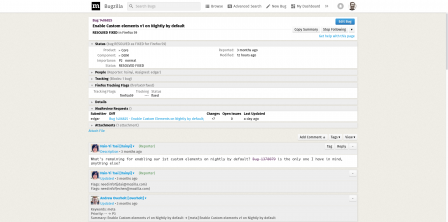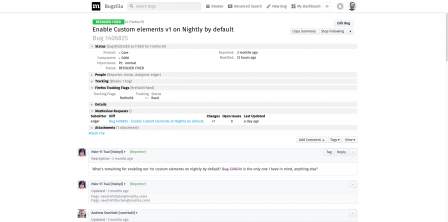Summary of what I did last quarter (regular l10n-drivers work such as patch reviews, pushes to production, meetings and past projects maintenance excluded) .
Australis release
At the end of April, we shipped Firefox 29 which was our first major redesign of the Firefox user interface since Firefox 4 (released in 2011). The code name for that was Australis and that meant replacing a lot of content on mozilla.org to introduce this new UI and the new features that go with it. That also means that we were able to delete a lot of old content that now had become really obsolete or that was now duplicated on our support site.
Since this was a major UI change, we decided to show an interactive tour of the new UI to both new users and existing users upgrading to the new version. That tour was fully localized in a few weeks time in close to 70 languages, which represents 97.5% of our user base. For the last locales not ready on time, we either decided to show them a partially translated site (some locales had translated almost everything or some of the non-translated strings were not very visible to most users, such as alternative content to images for screen readers) or to let the page fall back to the best language available (like Occitan falling back to French for example).
Mozilla.org was also updated with 6 new product pages replacing a lot of old content as well as updates to several existing pages. The whole site was fully ready for the launch with 60 languages 100% ready and 20 partially ready, all that done in a bit less than 4 weeks, parallel to the webdev integration work.
I am happy to say that thanks to our webdev team, our amazing l10n community and with the help of my colleagues Francesco Lodolo (also Italian localizer) and my intern Théo Chevalier (also French localizer), we were able to not only offer a great upgrading experience for the quasi totality of our user base, we were also able to clean up a lot of old content, fix many bugs and prepare the site from an l10n perspective for the upcoming releases of our products.
Today, for a big locale spanning all of our products and activities, mozilla.org is about 2,000 strings to translate and maintain (+500 since Q1), for a smaller locale, this is about 800 strings (+200 since Q1). This quarter was a significant bump in terms of strings added across all locales but this was closely related to the Australis launch, we shouldn't have such a rise in strings impacting all locales in the next quarters.
Transvision releases
Last quarter we did 2 releases of Transvision with several features targeting out 3 audiences: localizers, localization tools, current and potential Transvision developers.
For our localizers, I worked on a couple of features, one is quick filtering of search results per component for Desktop repositories (you search for 'home' and with one click, you can filter the results for the browser, for mail or for calendar for example). The other one is providing search suggestions when your search yields no results with the best similar matches ("your search for 'lookmark' yielded no result, maybe you were searching for 'Bookmark'?").
For the localization tools community (software or web apps like Pontoon, Mozilla translator, Babelzilla, OmegaT plugins...), I rewrote entirely our old Json API and extended it to provide more services. Our old API was initially created for our own purposes and basically was just giving the possibility to get our search results as a Json feed on our most popular views. Tools started using it a couple of years ago and we also got requests for API changes from those tool makers, therefore it was time to rewrite it entirely to make it scalable. Since we don't want to break anybody's workflow, we now redirect all the old API calls to the new API ones. One of the significant new service to the API is a translation memory query that gives you results and a quality index based on the Levenshtein distance with the searched terms. You can get more information on the
new API in our documentation.
I also worked on improving our internal workflow and make it easier for potential developers wanting to hack on Transvision to install and run it locally. That meant that now we do continuous integration with Travis CI (all of our unit tests are ran on each commit and pull request on PHP 5.4 and 5.5 environments), we have made a lot of improvements to our unit tests suite and coverage, we expose to developers peak memory usage and time per request on all views so as to catch performance problems early, and we also now have a "dev" mode that allows getting Transvision installed and running on the PHP development server in a matter of minutes instead of hours for a real production mode. One of the blockers for new developers was the time required to install Transvision locally. Since it is a spidering tool looking for localized strings in Mozilla source repositories, it needed to first clone all the repositories it indexes (mercurial/git/svn) which is about 20GB of data and takes hours even with a fast connection. We are now providing a snapshot of the final extracted data (still 400MB ;)) every 6 hours that is used by the
dev install mode.
Check the release notes for
3.3 and
3.4 to see what other features were added by the team (/ex: on demand TMX generation or dynamic Gaia comparison view added by Théo, my intern).
Web dashboard / Langchecker
The main improvement I brought to the web dashboard is probably this quarter the deadline field to all of our .lang files, which allows to better communicate the urgency of projects and for localizers are an extra parameter allowing them to prioritize their work.
Theo's first project for his internship was to build a 'project' view on the web dashboard that we can use to get an overview of the translation of a set of pages/files, this was used for the Australis release (ex:
http://l10n.mozilla-community.org/webdashboard/?project=australis_all) but can be used to any other project we want to define ,
here is an example for the localization of two Android Add-ons I did for the World Cup that we did and tracked with .lang files.
We brought other improvements to our maintenance scripts for example to be able to "bulk activate" a page for all the locales ready, we improved our locamotion import scripts, started adding unit tests etc. Generally speaking, the Web dashboard keeps improving regularly since I rewrote it last quarter and we regularly experiment using it for more projects, especially for projects which don't fit in the usual web/product categories and that also need tracking. I am pretty happy too that now I co-own the dashboard with Francesco who brings his own ideas and code to streamline our processes.
Théo's internship
I mentionned it before, our main French localizer Théo Chevalier, is doing an internship with me and Delphine Lebédel as mentors, this is the internship that ends his 3rd year of engineering (in a 5 years curriculum). He is based in Montain View, started early April and will be with us until late July.
He is basically working on almost all of the projects I, Delphine and Flod work on.
So far, apart from regular work as an l10n-driver, he has worked for me on 3 projects, the Web Dashboard projects view, building TMX files on demand on Transvision and the
Firefox Nightly localized page on mozilla.org. This last project I haven't talked about yet and he
blogged about it recently, in short, the first page that is shown to users of localized builds of Firefox Nightly can now be localized, and by localized we don't just mean translated, we mean that we have a community block managed by the local community proposing Nightly users to join their local team "on the ground". So far, we have this page in French, Italian, German and Czech, if your locale workflow is to translate mozilla-central first, this is a good tooll for you to reach a potential technical audience to grow your community .
Community
This quarter, I found 7 new localizers (2 French, 1 Marahati, 2 Portuguese/Portugal, 1 Greek, 1 Albanian) to work with me essentially on mozilla.org content. One of them, Nicolas Delebeque, took the lead on the Australis launch and coordinated the French l10n team since Théo, our locale leader for French, was starting his internship at Mozilla.
For Transvision, 4 people in the French community (after all, Transvision was created initially by them ;)) expressed interest or small patches to the project, maybe all the efforts we did in making the application easy to install and hack are starting to pay, we'll probably see in Q3/Q4 :)
I spent some time trying to help rebuild the Portugal community which is now 5 people (instead of 2 before), we recently resurrected the
mozilla.pt domain name to actually point to a server, the MozFR one already hosting the French community and WoMoz (having the French community help the Portuguese one is cool BTW). A mailing list for Portugal was created (accessible also as nntp and via google groups) and the #mozilla-portugal IRC channel was created. This is a start, I hope to have time in Q3 to help launch a real Portugal site and help them grow beyond localization because I think that communities focused on only one activity have no room to grow or renew themselves (you also need coding, QA, events, marketing...).
I also started looking at Babelzilla new platform rewrite project to replace the current aging platform (
https://github.com/BabelZilla/WTS/) to see if I can help Jürgen, the only Babelzilla dev, with building a community around his project. Maybe some of the experience I gained through Transvision will be transferable to Babelzilla (was a one man effort, now 4 people commit regularly out of 10 committers). We'll see in the next quarters if I can help somehow, I only had time to far to install the app locally.
In terms of events, this was a quiet quarter, apart from our l10n-drivers work week, the only localization event I was in was the localization sprint over a whole weekend in the Paris office. Clarista, the main organizer
blogged about it in French, many thanks to her and the whole community that came over, it was very productive, we will definitely do it again and maybe make it a recurring event.
Summary
This quarter was a good balance between shipping, tooling and community building. The beginning of the quarter was really focused on shipping Australis and as usual with big releases, we created scripts and tools that will help us ship better and faster in the future. Tooling and in particular Transvision work which is probably now my main project, took most of my time in the second part of the quarter.
Community building was as usual a constant in my work, the one thing that I find more difficult now in this area is finding time for it in the evening/week end (when most potential volunteers are available for synchronous communication) basically because it conflicts with my family life a bit. I am trying to be more efficient recruiting using asynchronous communication tools (email, forums…) but as long as I can get 5 to 10 additional people per quarter to work with me, it should be fine with scaling our projects.



![[object Object]](/carnet/public/bugillaStylish/.Screenshot-2018-1-10_1408044_-_Stop_shipping_about__1__m.png)

